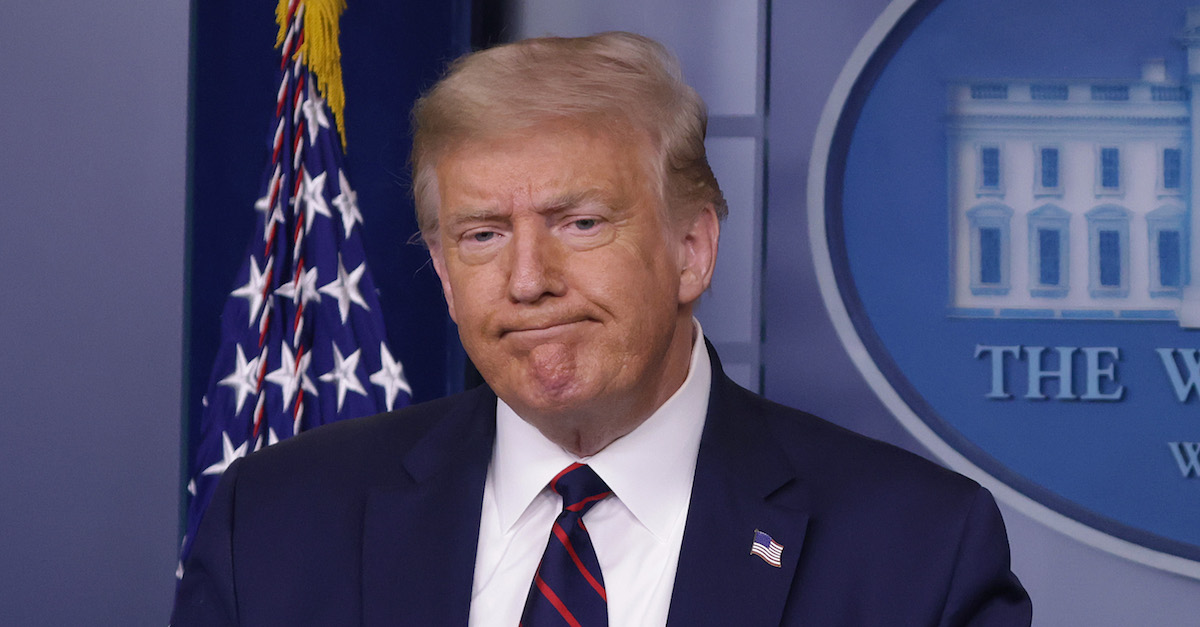
The Department of Justice on Thursday asked the U.S. Supreme Court to review a lower court’s decision which declared it unconstitutional for President Donald Trump to block his critics on Twitter. In a lengthy 187-page petition to the court, DOJ attorneys argued that the ruling blurs the line between the president’s public and private conduct.
Acting U.S. Solicitor General Jeffery Wall asserted that Trump – who created the account in 2009 – uses the platform to make personal statements outside the scope of his role as president and should be permitted to block his critics like any other user.
“The president uses his account to speak to the public, not to give members of the public a forum to speak to him and among themselves,” Wall wrote.
“Denying him the power to exclude third parties’ accounts from his personal account – a power that every other owner of a Twitter account possesses – would deter holders of his office from using new technology to efficiently communicate to a broad public audience.”
Former federal prosecutor and CNN legal analyst Elie Honig wasn’t too keen on the DOJ’s chances of succeeding, writing that the case has a “0.00 percent chance of success.”
As previously reported by Law&Crime, the Second Circuit opinion which held Trump was constitutionally prohibited from blocking Twitter followers resulted from a lawsuit filed by the Knight First Amendment Institute at Columbia University. The lawsuit argued that the manner in which President Trump and his aides used the official @realDonaldTrump Twitter account made it a “key channel for official communication” from the government and that meant access to it was protected by the First Amendment.
The three-judge panel on the court agreed, rejecting the government’s contention that Trump’s use of the social media platform was merely personal.
“This debate, as uncomfortable and as unpleasant as it frequently may be, is nonetheless a good thing,” wrote U.S. Circuit Judge Barrington Parker, an appointee of President Bill Clinton. “In resolving this appeal, we remind the litigants and the public that if the First Amendment means anything, it means that the best response to disfavored speech on matters of public concern is more speech, not less.”
The 2019 decision also emphasized that Trump’s tweets were “clothed with the authority of the state using social media as a tool of governance and as an official channel of communication on an interactive public platform.”
Harvard Law School professor and constitutional scholar Laurence Tribe said the Second Circuit’s initial decision was correct and should be allowed to stand.
“The District Court and the Court of Appeals were right to hold the 1st Amendment prevents POTUS from engaging in such censorship. There’s no good reason for SCOTUS to grant a hearing,” Tribe tweeted.
Jameel Jaffer, the Knight Institute’s executive director implored the justices not to take the case on in a future term.
“This case stands for a principle that is fundamental to our democracy and basically synonymous with the First Amendment: government officials can’t exclude people from public forums simply because they disagree with their political views,” Jaffer said in a statement.
“The Supreme Court should reject the White House’s petition and leave the appeals court’s careful and well-reasoned decision in place.”
Read the full petition below.
Trump Twitter SCOTUS Petition by Law&Crime on Scribd
(Photo by Alex Wong/Getty Images)